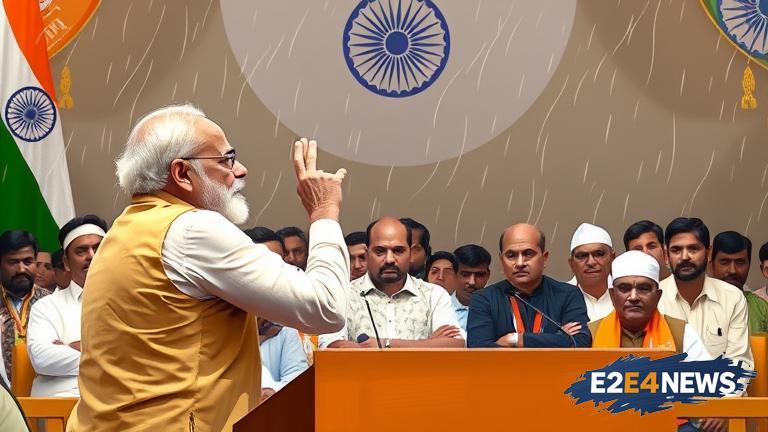The Indian political landscape is witnessing a significant surge in activity, with Prime Minister Narendra Modi addressing a key meeting of the National Democratic Alliance (NDA) to discuss the upcoming Vice Presidential elections and the Monsoon Session of Parliament. The meeting, which was attended by top leaders of the NDA, including BJP president JP Nadda and Union ministers, aimed to strategize and finalize the alliance’s stance on various issues. The Vice Presidential elections, scheduled to take place on August 6, have gained significant attention, with the opposition parties gearing up to put up a united fight against the NDA candidate. The Monsoon Session of Parliament, which commenced on July 18, has been marked by opposition uproar, with various parties protesting against the government’s policies and decisions. The opposition has been demanding discussions on key issues such as price rise, unemployment, and the border dispute with China. Meanwhile, the government has been pushing for the passage of several key bills, including the GST amendment bill and the energy conservation bill. The NDA meeting also discussed the party’s strategy for the upcoming state assembly elections, including the crucial polls in Gujarat and Himachal Pradesh. The BJP has been working to strengthen its organizational structure and expand its voter base in these states. The party has also been focusing on reaching out to the youth and marginalized communities, with an aim to increase its vote share. The opposition parties, on the other hand, have been trying to capitalize on the anti-incumbency factor and the perceived weaknesses of the BJP government. The Congress party, which has been struggling to regain its lost ground, has been working to revamp its organization and project a united face. The party has also been trying to build alliances with other opposition parties, including the Trinamool Congress and the Aam Aadmi Party. The Vice Presidential elections have also seen the entry of new players, with the opposition parties fielding a joint candidate, Margaret Alva. The NDA, on the other hand, has fielded Jagdeep Dhankhar, the current Governor of West Bengal, as its candidate. The elections are expected to be a close contest, with both sides claiming to have the numbers to win. The Monsoon Session of Parliament has also seen several key debates and discussions, including the one on the price rise and the border dispute with China. The government has been facing opposition flak for its handling of these issues, with the opposition parties demanding more effective measures to tackle the challenges. The session has also seen the introduction of several key bills, including the one on the maintenance of the wife and children. The government has been pushing for the passage of these bills, which are aimed at strengthening the social and economic fabric of the country. The opposition parties, however, have been opposing some of these bills, citing concerns over their impact on the marginalized communities. The NDA meeting also discussed the party’s strategy for the upcoming local body elections, including the polls in Maharashtra and Karnataka. The party has been working to strengthen its grassroots organization and reach out to the voters at the local level. The meeting also saw discussions on the party’s social media strategy, with an aim to increase its online presence and reach out to the youth. The BJP has been working to leverage social media to its advantage, with an aim to build a strong narrative and counter the opposition’s propaganda. The party has also been focusing on building a strong data analytics team, with an aim to analyze the voter behavior and tailor its campaign accordingly. The NDA meeting was also attended by several key leaders from the ally parties, including the Shiv Sena and the Akali Dal. The meeting saw discussions on the alliance’s strategy for the upcoming elections, including the polls in Punjab and Maharashtra. The NDA has been working to strengthen its alliance with these parties, with an aim to increase its vote share and expand its electoral base.





